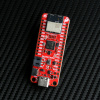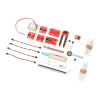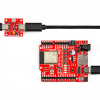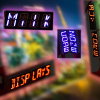We've made a big deal about how the Intel Edison is not a Raspberry Pi -- and it's true, it's not. But as we've said, it's not meant to be. The Edison, the Raspberry Pi and the Beaglebone Black all have their strengths and their weaknesses. With that said, it can be interesting to see how they stack up against each other for various tasks.
Image courtesy of DavidHunt.ie
In this article from David Hunt, he pits the three products against each other in some tests to see how they stack up. The results are interesting.
Ultimately, the Edison tested out to be by far the fastest of the bunch. Is that what you need for your project? Maybe -- or maybe not. But sometimes, speed is the name of the game -- in which case, maybe check out the Edison.
Read the full article here to see all the tests and more details about what David did.









Also you can find the same test performed in RK3066 and ODROID-U3
Raspberry para torpes
I have a couple complaints about the "review." He uses 1 thread for RPi and BBB and uses 2 for Edison... But says that "using one effectively doubles the time." Generally, this is true, but it's not proper. You need to have the same test setup for all platforms. Homogeneous testing is a must in cases like this.
Also doesn't mention the setup he's using for each of these, just uses the sysbench. What computer is he using to communicate? USB 1.1? USB 2.0? OS used? (He might have it in the comments somewhere, but doesn't update the article with the info).
He also just focuses on just memory and CPU, which is fine, but doesn't tell the whole picture of the pros/cons to each platform.
To me, reviews are supposed to be in-depth and critical of all type of operations, this is only good to see raw CPU/memory difference between all 3 platforms in a limited scope.
sgrace, nowhere in the article do I mention that it's a "review". Or indeed is it mentioned in the above synopsis. ".. to see raw CPU/memory difference between all 3 platforms in a limited scope" was precisely the intention of the article. Thank you for your feedback, nonetheless.
Jetson tk-1?
Right now, I think its going to come down to which of the three has the largest group of users adding new content, functions, and applications. Although, having a super fast embedded system like the Edison isn't bad, it's the learning curve and ease of use that will dictate if people want to use it. The original Beagle Board is one example where it wasn't possible to compile on board and having to build the Linux OS from scratch with OpenEmbedded made adoption slow when it first came out.
I have a Raspberry Pi and a BBB, I was excited to get my BBB and had expected to be as good or better than my Pi. I was extremely underwhelmed. The BBB is not worth the money, it is not a well thought out device.
The BBB is not too bad, it has a lot of bang for the price but, the user community isn't there like the Raspberry Pi.
I am really excited to see that edison can pack so much punch for such a tiny device ....... Benchmarks aside, the original article mentions that the developer literally "felt the snappiness" in his/her application.
So I can get 5 Pi's for the price of one Edison. If I run all 5 Pi's in parallel, would they be as fast or faster than the Edison? :-)
I think the point at the end of the article is you can only get 2 Pi's (or 1 Tau) for the price of one Edison.
Link is broken: http://www.davidhunt.ie/raspberry-pi-beaglebone-black-intel-edison-benchmarked/